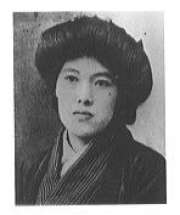|
Biografie Yosano Akiko
Akiko Yosano, 7 December 1878 - 29 May 1942) was the pen-name of a Japanese author, poet, pioneering feminist, pacifist, and social reformer, active in late Meiji period, Taishō period and early Showa period Japan. Her real name was Yosano Shiyo. She is one of the most famous, and most controversial, post-classical woman poets of Japan.
Yosano was born the daughter of a rich merchant in Sakai, Osaka. From early childhood, she was fond of reading literary works while she helped her family business. When she was a high school student, she began to subscribe to the poetry magazine Myōjō (Bright Star), and she became one of its most important contributors. Myōjō’s editor, Yosano Tekkan, taught her tanka poetry and sometimes visited her in Sakai.
Although Tekkan was married, the two authors fell in love and started a new life together in the suburb of Tokyo. Tekkan eventually divorced his wife and married Akiko in 1901.
In 1901, Yosano brought out her first volume of tanka, Midaregami (Tangled Hair), which contained 400 poems and was very well received by literary critics. Her first book, which overshadows everything else she wrote, brought a passionate individualism to traditional tanka poetry, unlike any other work of the late Meiji period. She followed this with twenty more waka anthologies over the course of her career, including Koigoromo (Robe of Love) and Maihime (Dancer). Her husband Tekkan was also a poet, but he soon realized that Yosano's abilities were far greater than his, and he decided to concentrate his energies on helping her.
Yosano's poem Kimi Shinitamou koto nakare (君死にたもうこと勿れ, Thou Shalt Not Die), addressed to her brother, was published in Myōjō during the height of the Russo-Japanese War and was tremendously popular. Made into a song, it was used as a mild form of anti-war protest, as the number of Japanese casualties from the bloody Siege of Port Arthur became public.
During the Taishō period, Yosano turned her attention to social commentary, with Hito obyobi Onna to shite (As a Human and as a Woman), Gekido no Naka o Iku。 (Going through Turbulent Times) and her autobiography Akarumi e (To the Light). Her commentaries tended to criticize Japan's growing militarism, and also promoted her feminist viewpoints.
Yosano founded a coeducational school, the Bunka Gakuin (Institute of Culture), together with Nishimura Isaku, Kawasaki Natsu and others, and became its first dean and chief lecturer. She helped many aspiring writers gain a foothold into the literary world. She was a strong advocate of women's education all of her life. She also translated the Japanese classics into the modern Japanese language, including the Shinyaku Genji Monogatari (Newly Translated Tale of Genji) and Shinyaku Eiga Monogatari (Newly Translated Tale of Flowering Fortunes).
Her final work, Shin Man'yōshū (New Man'yōshū, 1937-1939) was a compilation of 26,783 poems by 6,675 contributors over a 60-year period.
Yosano died of a stroke in 1942, at the age of 63. As her death occurred in the middle of the Pacific War, it went largely unnoticed in the press, and after the end of the war, her works were largely forgotten by critics and the general public. However, in recent years, her romantic, sensual style has come back into popularity and she has an ever increasing following. Her grave is at the Tama Reien in the outskirts of Tokyo.
The Japanese politician Kaoru Yosano (Yosano Kaoru) is one of her grandsons.
|




